
Updated in April 2024
Before we dive into the best StatusHub alternatives, let’s quickly recap the tool’s capabilities.
In short, StatusHub is an IT incident communication tool. As indicated by its name, StatusHub is focused on creating and managing status pages. Users get to leverage their connected hub of status pages to communicate system statuses, incidents, and maintenance updates to different audiences, customers, and stakeholders. StatusHub is used by hundreds of teams including educational organizations and large enterprises and is home to the Citrix cloud status page at status.cloud.com, among many others.
The product is accessible to organizations of all sizes, allowing them to communicate effectively with their customers. It excels in customer-facing communication, providing clear and accessible updates about service status and incidents, and includes a unique UI that shows summary data at the top of the page in a clear and concise manner.
StatusHub’s primary function is to serve as a communication channel during incidents, rather than offering comprehensive incident management features. For monitoring, it leverages a host of integrations with third-party monitoring tools, including StatusGator.
StatusHub users can integrate their StatusGator account to send data from StatusGator to StatusHub. When your providers experience an incident, StatusGator detects the change to their status page and updates a corresponding component in your StatusHub, creating an incident you can react to and communicate on your status page if it affects your infrastructure.
Why StatusHub Is Great And You May Not Need An Alternative?
There’s no other company that can be deemed a hub for a status page, making it a truly unique one that excels at communicating service status across a large swath of infrastructure. Their hub of status pages is a one-of-a-kind feature, and StatusHub competitors who also provide services of incident communication do not offer a status page hub.
StatusHub does a great job as an incident communication tool, covering all the potential needs integrating with tools like StatusGator, PagerDuty, Site24x7, and others.
StatusGator strongly recommends StatusHub to our users and encourages them to leverage our direct integration for more efficient incident monitoring and communication. The feedback has been overwhelmingly positive, affirming that StatusHub effectively meets all the criteria for incident communication and monitoring.

The Top 10 Best StatusHub Competitors
1. Better Stack

Being our opening alternative to StatusHub, the Better Stack Incident Management platform is all about streamlining the incident communication process for engineering teams. As described on their website, Better Stack claims they can “resolve downtime faster than ever”. They also praise their lower prices, stating that they are 17x cheaper than DataDog.
Better Stack and StatusHub both operate in the sphere of incident communication. But these tools have distinct focuses and features that cater to somewhat different aspects of the process.
Better Stack excels in full-scale incident management, providing real-time monitoring and comprehensive analysis, while StatusHub is optimal for user-friendly status communication.
The choice between the two depends on whether detailed incident management or straightforward customer-facing updates are your organization’s priority.
Better Stack features: Better Stack integrates with infrastructure monitoring for real-time alerts and collaborative incident resolution, featuring on-call schedules, flexible escalations, and detailed audit timelines. Distinguishing itself with built-in monitors and integration capabilities, Better Stack offers a cost-effective alternative for comprehensive incident management, positioning competitively against platforms like PagerDuty and Pingdom. Essentially, BetterStack is a comprehensive incident management solution that not only notifies the right personnel but equips them with the necessary tools and information for effective incident resolution, providing a streamlined alternative to multiple tools like PagerDuty, Pingdom, and Statuspage.io.
2. UptimeRobot

Unlike some StatusHub alternatives, UptimeRobot’s primary function is website monitoring. However, they offer a free status page and various third-party integrations (including Slack, Zapier, and PagerDuty). Their suite of features makes them a valuable tool for incident communication and website monitoring, making them a strong StatusHub competitor.
UptimeRobot features: UptimeRobot provides website and online service monitoring through 30-second checks, ensuring quick detection of downtime or outages.
It supports various monitor types, including HTTP(s), keyword, ping, and port monitors, offering versatile coverage for potential issues.
The platform promptly sends alerts via email, SMS, voice calls, or third-party integrations with Slack and Microsoft Teams when outages or performance issues are detected.
Additionally, UptimeRobot offers features like public status pages for transparent incident communication, maintenance windows to schedule planned downtimes, and API access for integration with other tools.
This makes it suitable for organizations requiring ongoing monitoring and immediate incident detection, with the flexibility to customize incident communication workflows through third-party integrations and API capabilities.
3. Instatus
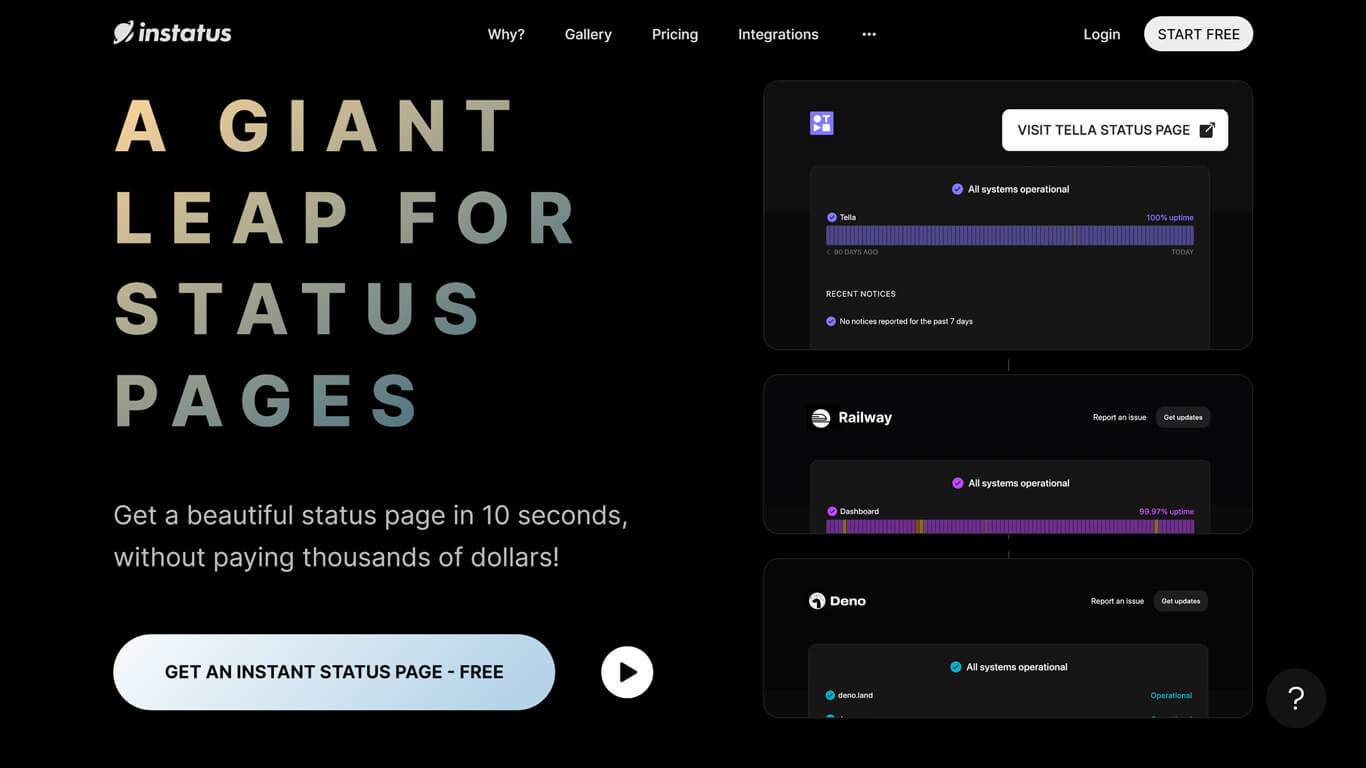
Instatus is an incident communication tool designed to help businesses and organizations communicate with their customers and stakeholders about the outages of their services, infrastructure, or applications. Their main method to do this is by offering users a free status page within 10 seconds according to their website.
Instatus features: Instatus helps its users communicate with their stakeholders effectively with a free, customizable status page. Users can display their service components, such as their website, mobile app, or API status. Also, they can add operational status and incident reporting for quick updates during outages.
Instatus also offers scheduled maintenance notifications, subscriber alerts, historical data tracking, team collaboration, integrations, security emphasis, and custom domain options, ensuring a transparent, secure, and branded experience for organizations managing their status communication.
Instatus stands out for organizations seeking customizable status pages with automated updates, offering more control over incident communication. On the other hand, StatusHub is geared towards status page management.
4. Uptime
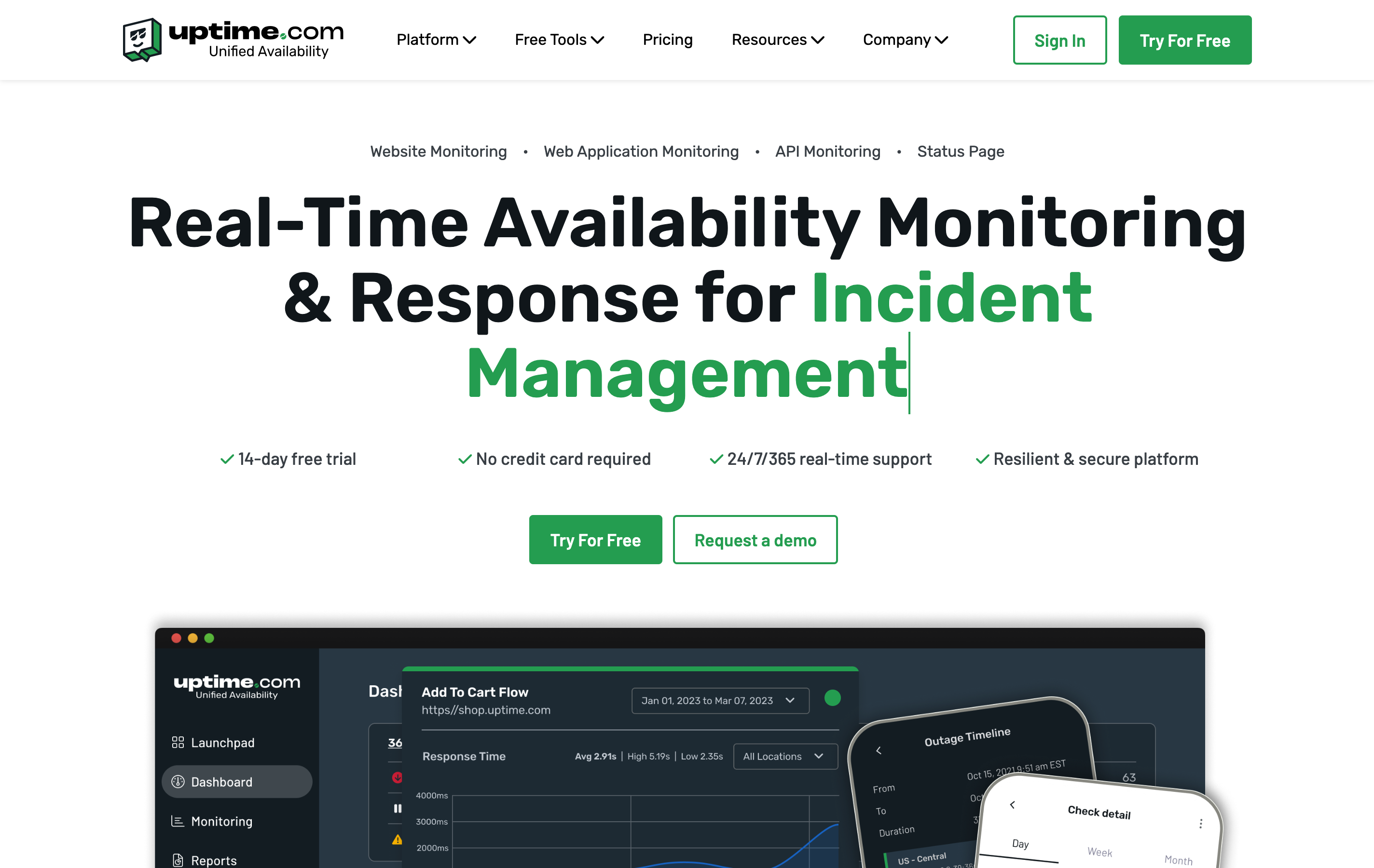
Uptime.com is an incident communication tool that offers a variety of features to help businesses monitor their online presence and communicate with their customers during incidents. They offer a suite of different communication and incident monitoring tools, including status pages, dashboard monitoring, and analytics tools.
Overall, Uptime.com is generally preferred for active monitoring and immediate incident detection, whereas StatusHub is more typically used for effective communication with external stakeholders about service status. Both offer a range of services based on their niche.
Uptime.com features: Users can create customizable status pages, and offer their customers to subscribe timely notifications.
The team gets real-time alerts about incidents, outages, or maintenance. Uptime offers multiple incident management tools with on-call scheduling, flexible escalations, unlimited voice call alerts, and integration with monitoring tools.
Designed as an alternative to tools like UptimeRobot, Uptime.com goes beyond many StatusHub alternatives with advanced status page features. These include testing of page speed, domain health tests, and global uptime.
5. FireHydrant
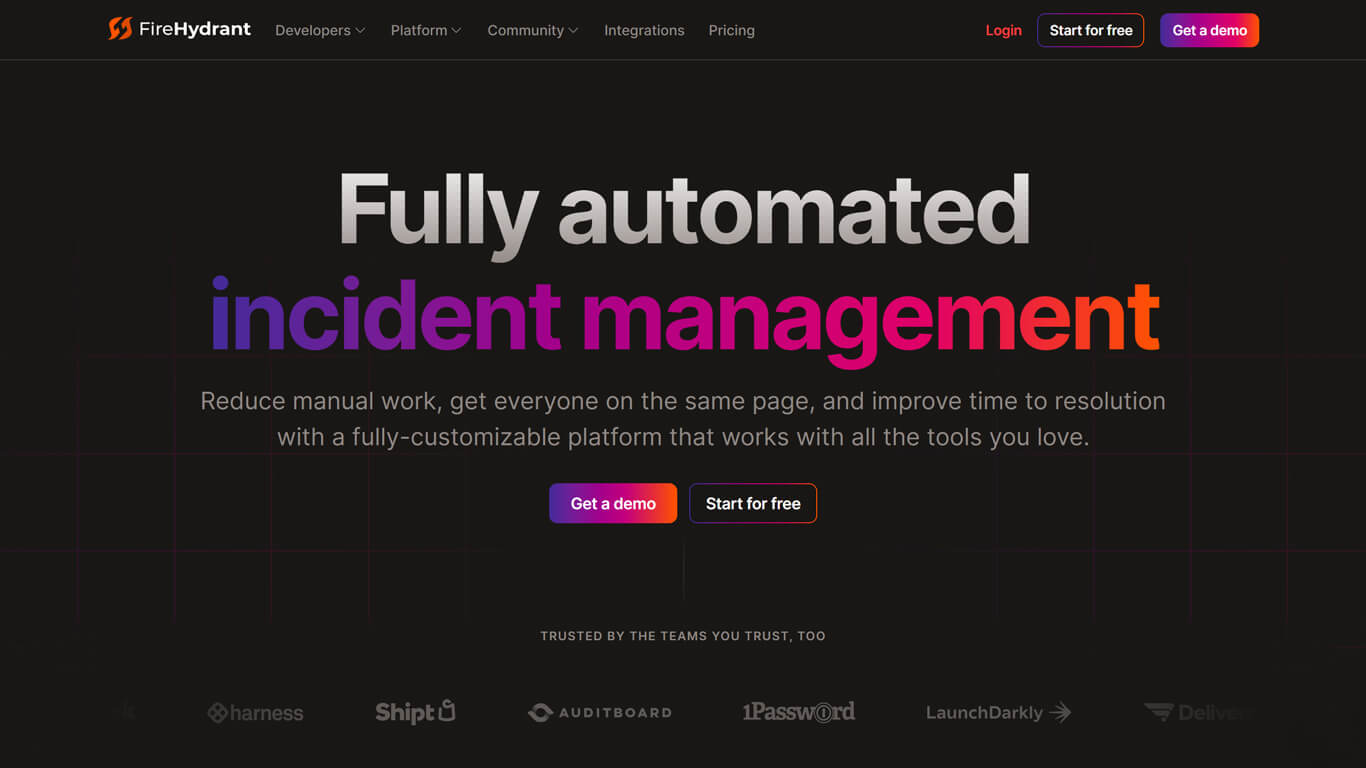
FireHydrant is an incident communication tool that offers a comprehensive approach to incident management, designed to streamline and organize the way teams respond to system failures, outages, and other technical issues. Unlike many StatusHub competitors, their key aim is to automate incident management as much as possible, ensuring an easy and smooth experience for users.
Compared to FireHydrant, StatusHub places less emphasis on automation and post-incident learning. Its primary function is to serve as a communication channel during incidents. FireHydrant aims to make the process simple and uncomplicated.
FireHydrant features: FireHydrant focuses on quick incident declaration, automated response processes, and real-time status communication. By automating these processes using a range of tools and monitoring/analytics, users can expect a quick and smooth process.
FireHydrant seamlessly integrates with various DevOps tools, automating tasks like creating incident channels, and also provides comprehensive tools for post-incident analysis to enhance response strategies to such incidents.
Customizable workflows ensure flexibility to meet specific team or organizational needs, making FireHydrant a versatile, yet simple, StatusHub alternative.
6. ServiceNow

ServiceNow is an incident communication tool, similar to StatusHub. However, it isn’t quite the usual StatusHub alternative, as ServiceNow offers a range of functionalities that extend beyond traditional incident management. Specifically, functionalities that fall in the realm of IT Service Management (ITSM) and IT Operations Management (ITOM).
When compared to StatusHub, ServiceNow appears as a more specialized tool focused on status communication, ServiceNow offers a full suite of ITSM tools.
ServiceNow features: ServiceNow integrates various IT processes and optimizes resource allocation within its ITSM suite to allow for efficient incident automation. This makes ServiceNow a handy StatusHub alternative for large-scale IT operations.
Furthermore, the platform is highly customizable, offering organizations extensive options to tailor it to their specific processes, brands, and needs.
ServiceNow also enables organizations to analyze incidents, monitor trends, and make informed, data-driven decisions with powerful analytics and reporting features. They emphasize scalability and offer a broad range of integrations with other enterprise tools.
If your organization is seeking a comprehensive ITSM with advanced capabilities in automation, customization, and analytics as a StatusHub alternative, ServiceNow could be the choice for you.
7. Squadcast
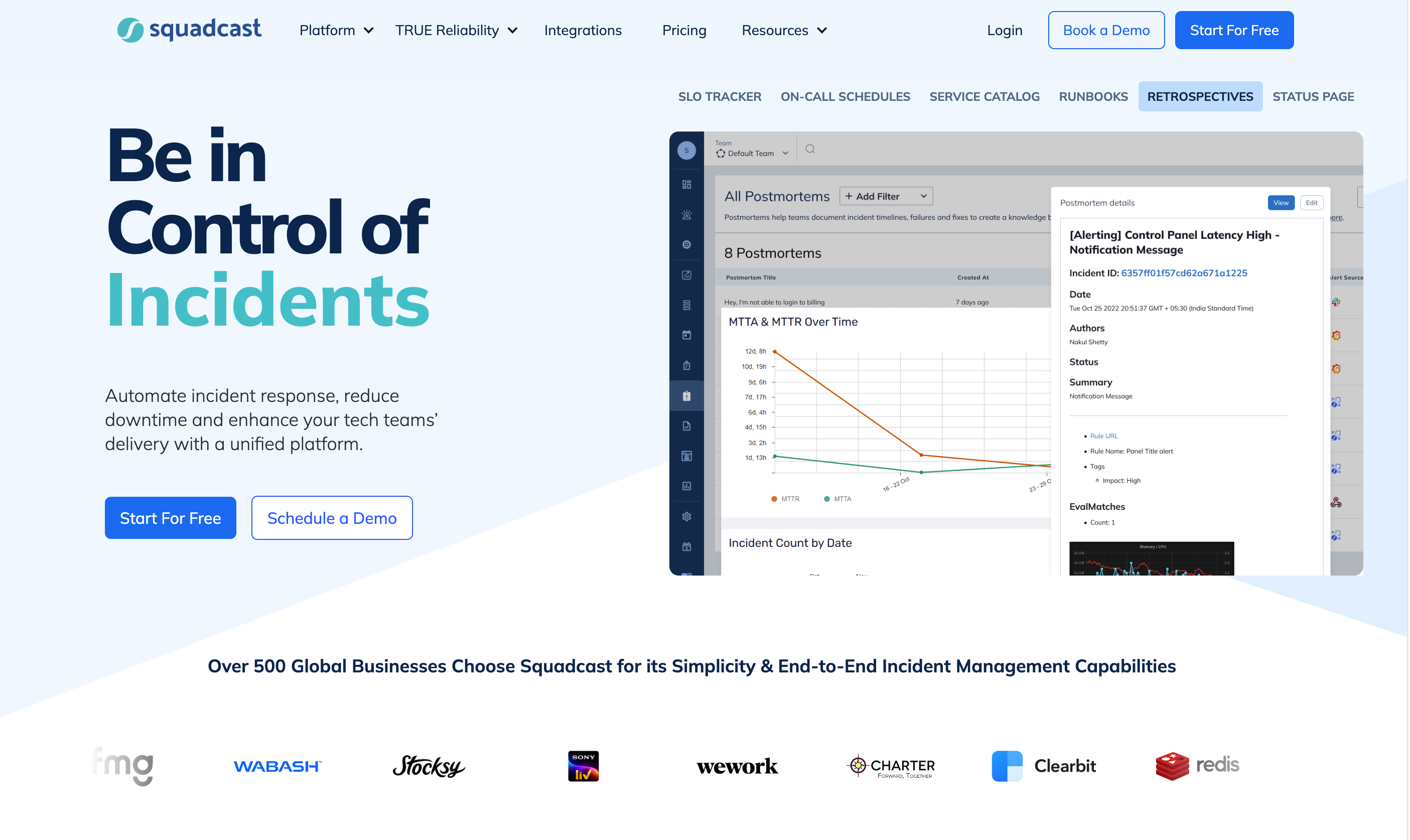
Squadcast, as an incident communication tool, focuses on minimizing downtime and improving operational efficiency. When compared to StatusHub, which is more centered on providing status updates and communication with external stakeholders, Squadcast focuses more on efficiency and automation similar to FireHydrant and ServiceNow. But, its features make it a popular StatusHub alternative and competitor.
Squadcast features: Squadcast offers on-call scheduling, automation of incident response processes, and seamless integration with monitoring and collaboration tools.
The platform stands out for its post-incident reporting and analysis tools, crucial for understanding incident causes and preventing future occurrences.
With a user-friendly interface, Squadcast is well-suited for organizations seeking robust incident management capabilities, aiming to reduce mean time to resolution and enhance overall response efficiency. They also include Runbooks – a feature that allows users to automate repetitive tasks to save time.
8. PagerDuty

PagerDuty is primarily designed to cater to the needs of modern operations teams. When compared to StatusHub, which is primarily focused on status communication to customers and stakeholders, the distinctions between the two tools become clear:
PagerDuty features: Notable features include sophisticated on-call scheduling and escalation policies, seamless integration with monitoring tools and collaboration platforms, and real-time analytics for assessing incident trends and response effectiveness.
PagerDuty also offers automation capabilities for incident resolution processes, streamlining handling, and reducing manual efforts. Due to recent advancements in AI, PagerDuty has adopted an AI-powered operations platform.
PagerDuty is a popular StatusHub alternative. It is ideal for organizations seeking a robust platform for managing the entire lifecycle of incidents, from detection to resolution, especially those that require advanced on-call scheduling, alerting, and automation capabilities. On the other hand, StatusHub is preferred if your focus is on communicating incident updates to customers with an easy-to-use interface.
9. Opsgenie
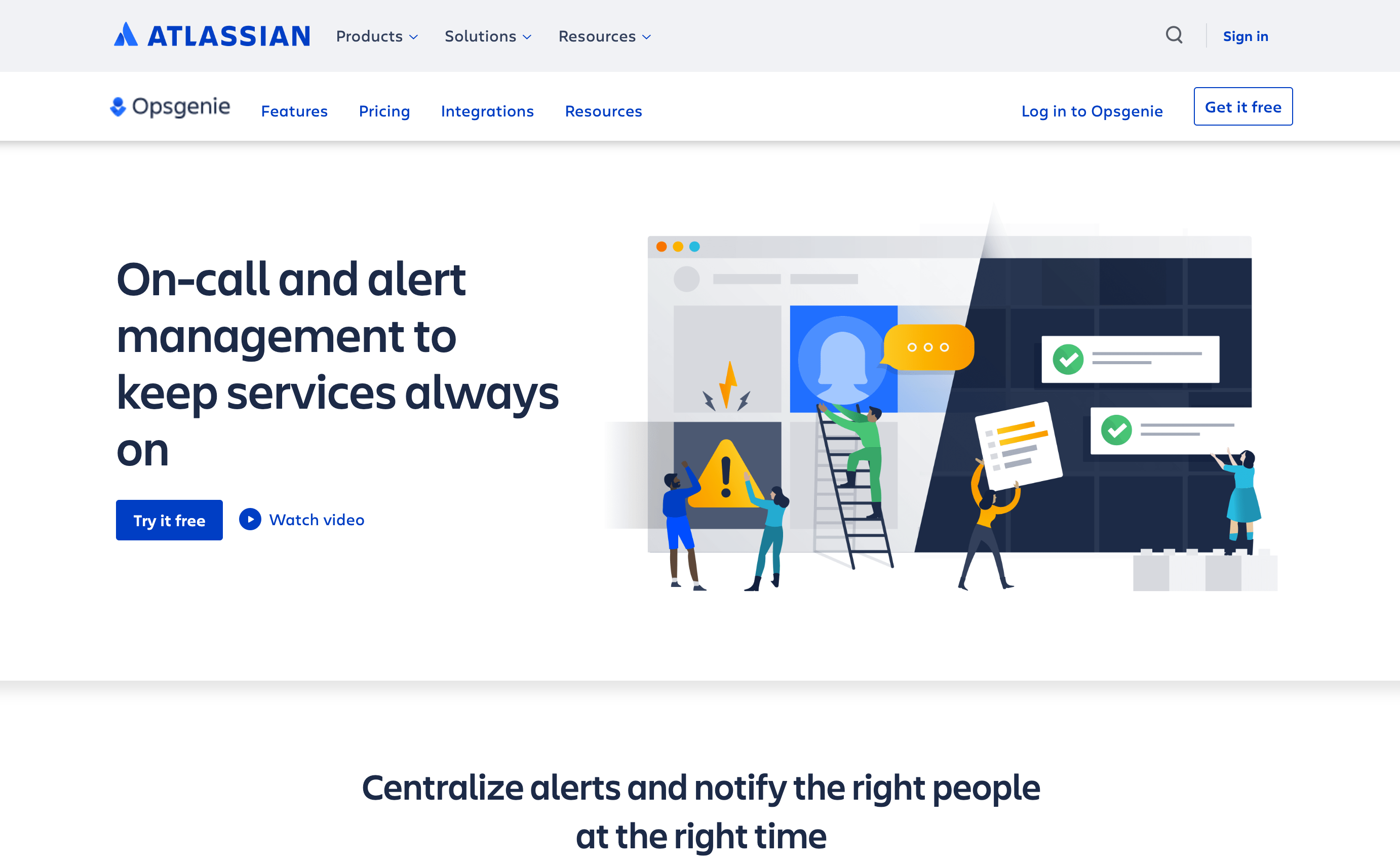
Powered by Atlassian, Opsgenie is tailored for modern IT and DevOps teams, focusing on effective incident response and management. It stands out for its alerting and on-call management features, making it quite distinct from StatusHub, which is primarily a status page and communication platform.
Opsgenie features: Opsgenie is a popular StatusHub alternative when it comes to alerting and on-call management.
Their platform ensures swift incident response by notifying the right individuals quickly in the event of an outage or downtime. The platform integrates with various monitoring, ticketing, and collaboration tools, aiding in quick incident detection and response.
Opsgenie offers customizable incident responses with features like routing rules, escalation policies, and scheduling, allowing teams to tailor their responses.
With tools for post-incident analysis and reporting, Opsgenie also enables teams to understand incident impacts and enhance future responses.
Additionally, the platform fosters effective team collaboration during incident response, facilitating communication and coordination among team members. If detailed incident management and response capabilities are your focus, Opsgenie is the preferred choice.
10. Splunk
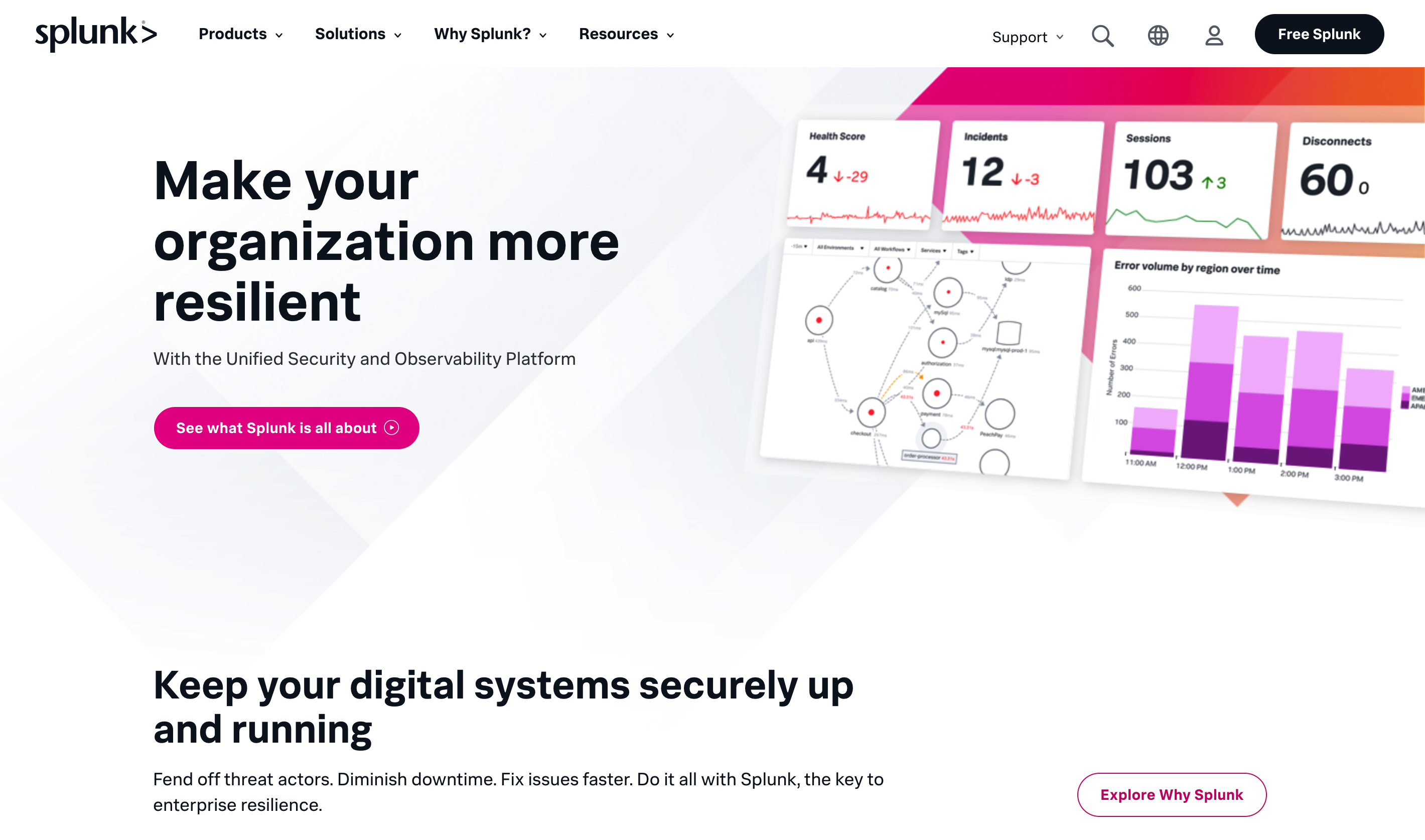
Splunk, primarily known for its capabilities in data analysis and monitoring, also offers functionalities as an incident communication tool, particularly through its IT Service Intelligence (ITSI) module. This positions it differently from StatusHub and their competitors and alternatives.
Primarily, this is because StatusHub is a specialized tool for status communication and management. On the other hand, Splunk is primarily a data analysis tool.
Splunk features: Splunk’s features extend to its integration with various tools and platforms, similar to other StatusHub alternatives. This aids its capabilities in monitoring, alerting, and incident response.
The platform offers advanced reporting and dashboard features, enabling teams to track incidents, analyze trends, and make informed, data-driven decisions. Particularly with its ITSI module, Splunk is ideal for organizations seeking a data-centric approach to incident management, emphasizing strong analytics, monitoring, and customizable alerts.
If your priority is in-depth, data-driven incident detection and analysis with powerful analytics capabilities, Splunk would be the preferred option.
Conclusion
When it comes to finding a StatusHub alternative, there are several unique StatusHub competitors on the market. Like StatusHub, many of its competitors offer incident communication tools, ranging from customizable status pages to analytics software.
To know which StatusHub alternative is right for you, it’s important to look in-depth into what features and services they offer. Our breakdowns provide an overview, but to make sure you pick the best option, you must compare your requirements and functionalities offered by incident communication tools. You might discover that connecting StatusHub with your existing tools might be just what you need.

FAQ on Alternatives to StatusHub
What is StatusHub?
StatusHub is an incident communication platform operating as a hub of status pages to communicate system statuses, maintenance, updates, and downtime.
Why might I need a StatusHub alternative?
Users seek StatusHub alternatives for various reasons such as specific feature requirements, budget considerations, or a need for a different user interface. Our article explores some unique and popular StatusHub alternatives in 2024, including integration with StatusGator which significantly improves status monitoring, a unique incident communication tool that can aggregate all your organization’s services and statuses into one status page (including third-party).
How do I determine the best StatusHub alternative for my organization?
Looking for the best StatusHub alternative, consider team size, communication preferences, integration requirements, and budget constraints. Another option could be looking into the integration with StatusGator. It might be enough to meet the needs of your organization and you won’t need to switch providers. In case you are determined to find the best alternative to StatusHub, our article provides insights into various alternatives, helping you make an informed decision.
What are the key features to look for in a StatusHub alternative?
As for StatusHub alternatives, look for features such as real-time incident updates, customizable communication channels, integration capabilities with other tools, ease of use, and scalability.
What StatusHub alternatives are suitable for small businesses?
The StatusHub alternatives that are suitable for small businesses are Instatus and Uptime. Another option for a small organization is to look into the integration of StatusHub and StatusGator. The integration might cover your organization’s needs so won’t need to switch to a StatusHub alternative.



